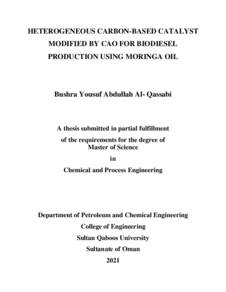Document
Heterogeneous carbon-based catalyst modified by CaO for biodiesel production using moringa oil.
Other titles
انتاج وقود الديزل الحيوي من خلال استخدام محفز غير متجانس قائم على الكربون والذي تم تعديله بواسطة أكسيد الكالسيوم وبإستخدام زيت المورينجا
Publisher
Sultan Qaboos University.
Gregorian
2021
Language
English
English abstract
In this study, biodiesel is produced using a synthesized, dual-functional heterogeneous catalyst
using nonedible plant-based oil to produce biodiesel as a cleaner fuel to conserve the environment
and meet the current energy demand. Pristine carbon as a support for the catalyst is produced from
waste date seeds powder before oil extraction and modified with alkaline earth metal oxides to
utilize it for transesterification to produce biodiesel. Two catalysts have been tested, carbon-based
catalysts modified by CaO and MgO. Synthesized catalysts prior usage are characterized by
several techniques which include XRD, SEM, BET and TPD. The catalysts characterization
revealed their suitability for transesterification reaction. Then, two transesterification reactions in
parallel are conducted to test the yield of both catalysts at the same reaction parameters and the
resultant yield from each catalyst is recorded. CaO modified with carbon has the highest yield of
79.03% while MgO modified with carbon achieved 54.60% yield. These results were achieved
under the same reaction conditions of 12:1 of methanol to oil ratio, 1 wt% of catalyst loading, 60℃
and 150 min reaction time. Accordingly, process optimization is conducted using CaO modified
with carbon synthesized catalyst for the reaction. The optimized yield of biodiesel is 89.5 % when
the set parameters of a temperature of 65 ◦C, time 90 min, methanol to oil molar ratio of 15 :1 and
catalyst loading of 3 wt% using CaO modified with carbon. Thus, this study gave an overall
complete scenario from an economical catalyst and a non-edible oil to efficient fuel production
which can be advantageous in the society.
Member of
Resource URL
Arabic abstract
في هذه الدراسة ، يتم انتاج وقود الديزل الحيوي بإستخدام محفز غير متجانس مركب ثنائي الوظيفة بإستخدام زيت نباتي غير
صالح للأكل إلنتاج وقود الديزل الحيوي كوقود أنظف للحفاظ على البيئة وتلبية الطلب الحالي على الطاقة. يتم إنتاج الكربون
البكر كدعم للمحفز من مسحوق بذور نفايات التمور قبل استخلاص الزيت وتعديله بإستخدام أكاسيد الفلزات القلوية الترابية
لإستخدامه في الأسترة التبادلية لإنتاج وقود الديزل الحيوي. تم اختبار محفزين، محفزات قائمة على الكربون تم تعديلها بواسطة
CaO و MgO. تم عمل تصنيف للمحفزات المركبة قبل الاستخدام لمعرفة خواصها ومميزاتها بإستخدام العديد من التقنيات
التي تشمل XRD و SEM و BET و TPD. كشف توصيف العوامل الحفازة عن مدى ملاءمتها لتفاعل الأسترة التبادلية.
بعد ذلك ، يتم إجراء تفاعلين استرة على التوازي لاختبار ناتج كلا المحفزات عند نفس معاملات التفاعل ويتم تسجيل العائد الناتج
من كل محفز. حقق أكسيد الكالسيوم المعدل بالكربون أعلى إنتاجية بنسبة ٪79.03 بينما حقق MgO المعدل بالكربون نسبة
.٪54.60 تم تحقيق هذه النتائج في نفس ظروف التفاعل: :12 1 من نسبة الميثانول إلى الزيت ، و 1 وزن٪ من تحميل المحفز، لذلك ، يتم إجراء تحسين لعملية انتاج الوقود الحيوي عند درجة حرارة 60 درجة سيليزية و 150 دقيقة من زمن التفاعل. وفقً
باستخدام CaO المعدل مع محفز الكربون المركب للتفاعل. يبلغ العائد األمثل للديزل الحيوي ٪89.5 عندما تكون المعلمات
المحددة لدرجة حرارة 65 درجة مئوية ، والوقت 90 دقيقة ، ونسبة الميثانول إلى الزيت المولي :15 1 وتحميل المحفز بنسبة
٪3 بالوزن باستخدام أكسيد الكالسيوم المعدل بالكربون وبالتالي ، أعطت هذه الدراسة سيناريو شاملا كاملا من محفز اقتصادي
وزيت غير صالح للأكل إلى إنتاج وقود فعال يمكن أن يكون مفيدًا في المجتمع.
صالح للأكل إلنتاج وقود الديزل الحيوي كوقود أنظف للحفاظ على البيئة وتلبية الطلب الحالي على الطاقة. يتم إنتاج الكربون
البكر كدعم للمحفز من مسحوق بذور نفايات التمور قبل استخلاص الزيت وتعديله بإستخدام أكاسيد الفلزات القلوية الترابية
لإستخدامه في الأسترة التبادلية لإنتاج وقود الديزل الحيوي. تم اختبار محفزين، محفزات قائمة على الكربون تم تعديلها بواسطة
CaO و MgO. تم عمل تصنيف للمحفزات المركبة قبل الاستخدام لمعرفة خواصها ومميزاتها بإستخدام العديد من التقنيات
التي تشمل XRD و SEM و BET و TPD. كشف توصيف العوامل الحفازة عن مدى ملاءمتها لتفاعل الأسترة التبادلية.
بعد ذلك ، يتم إجراء تفاعلين استرة على التوازي لاختبار ناتج كلا المحفزات عند نفس معاملات التفاعل ويتم تسجيل العائد الناتج
من كل محفز. حقق أكسيد الكالسيوم المعدل بالكربون أعلى إنتاجية بنسبة ٪79.03 بينما حقق MgO المعدل بالكربون نسبة
.٪54.60 تم تحقيق هذه النتائج في نفس ظروف التفاعل: :12 1 من نسبة الميثانول إلى الزيت ، و 1 وزن٪ من تحميل المحفز، لذلك ، يتم إجراء تحسين لعملية انتاج الوقود الحيوي عند درجة حرارة 60 درجة سيليزية و 150 دقيقة من زمن التفاعل. وفقً
باستخدام CaO المعدل مع محفز الكربون المركب للتفاعل. يبلغ العائد األمثل للديزل الحيوي ٪89.5 عندما تكون المعلمات
المحددة لدرجة حرارة 65 درجة مئوية ، والوقت 90 دقيقة ، ونسبة الميثانول إلى الزيت المولي :15 1 وتحميل المحفز بنسبة
٪3 بالوزن باستخدام أكسيد الكالسيوم المعدل بالكربون وبالتالي ، أعطت هذه الدراسة سيناريو شاملا كاملا من محفز اقتصادي
وزيت غير صالح للأكل إلى إنتاج وقود فعال يمكن أن يكون مفيدًا في المجتمع.
Category
Theses and Dissertations


